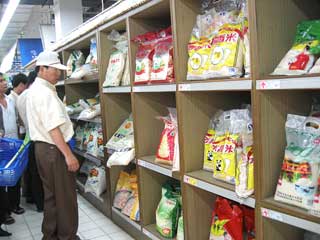|
Price hikes not to stop until October
By Fu Jing (China Daily)
Updated: 2004-06-24 00:02
Rising prices are putting pressure on the government, which claims soaring
investment has been curbed.
"The price hikes that started last January will continue and are expected to
become stable in October," said Cao Yushu, spokesman of the National Development
and Reform Commission (NDRC).

Customers select and buy rice at a supermarket in Ningbo, East China's
Zhejiang Province, June 23, 2004. Officials say prices are likely to continue
rising in the coming months. [newsphoto] | During a
press conference organized by the State Council Information Office Wednesday,
Cao ruled out the possibility of inflation in China but said consumers' prices
will continue to rise through the end of third quarter.
The National Bureau of Statistics said recently China's consumer prices were
4.4 per cent higher in May than the same month last year, the fastest pace in
seven years.
The consumer price index (CPI), policy-makers' key inflation gauge, rose a
year-on-year 3.9 per cent in urban areas but 5.2 per cent in the countryside.
"The indicators, not higher than international alarming line of 5 per cent,
are still under control," said Cao.
On Tuesday, Premier Wen Jiabao also expressed confidence that China will
achieve the goal of "soft landing" of the economy.
Since last August, in response to some outstanding contradictions and
problems in economic performance, the Chinese Government has taken a series of
measures that "have already yielded noticeable results, and China's national
economy has maintained steady and rapid growth," Wen said.
Investments in fixed assets grew by 18.3 per cent year-on-year in May, a
significant drop from the 34.7 per cent growth rate in April. Meanwhile, the
growth rate of industrial production, money supply, prices of capital goods, and
consumer price index also subsided to varying extents.
The electrolytic aluminum sector, one of the identified prominent overheated
sectors, is also cooling down.
In this process, the commission said, China's economy has maintained fast
growth momentum.
Industrial output grew 17.5 per cent year-on-year to 431 billion yuan
(US$52.5 billion) in May. Fiscal revenue, foreign exchange reserves, foreign
investment, people's income and market sales continued to rise.
Lin Yueqin, a researcher with Chinese Academy of Social Sciences, said the
achievements resulted from swiftly curbing blind investment and low-grade
capacity expansion in certain overheated sectors and rectifying the land market.
"All of these had been done through tightening credit and land control," said
Lin.
While straightening out investments in fixed assets and strictly cracking
down on transgressions, the government also adopted a series of measures to beef
up agriculture and weak links in the economy, Lin said.
Last Wednesday's executive meeting of the State Council, China's cabinet,
also held that the current economic situation is sound in general and the
government's macro-economic control measures have achieved remarkable results.
But the commission spokesman Cao pointed out major existing problems, like
the excessively large investment scale and the gap between supply and demand of
coal, electricity, oil and transporting capacity, and held that macro-control
must not let up.
Although lower than levels in 2003, the growth rate of investment in the
sectors of iron and steel, cement and aluminum remained at high levels,
economists said.
They were also concerned that coal supplies dropped to 98 million tons by the
end of April, the lowest point in 20 years.
Due to inadequate electricity supply capacity, 24 provinces, autonomous
regions and municipalities have experienced brownouts so far this year.
Railway freight capacity falls far short of demand. Due to limited capacity,
railway departments could meet only 35 per cent of the requests for freight
carriages in the first five months.
To solve the problems, Cao proposed some solutions including:
- Curb the fast growth of bank loans;
- Step up control over land management;
- Strengthen management of the grain market;
- Implement measures to deal with summer power shortages;
- Increase assistance to agriculture, water conservation, environment
and social undertakings.
| |
 |
|
 |
|
|
Today's
Top News |
|
|
|
Top China
News |
 |
|
 |
|
|
|
|
|
|


